Having spent already more than five days this September immersed in the outdoors with separate TALONS groups on Fall Retreats in Howe Sound and Sasquatch Provincial Park, I have been thinking lately of the importance that learning in the outdoors plays in a 21st century education. Opportunities for relevant, authentic learning experiences in the outdoors are able to powerfully combat the disconnect with the natural world that is arguably at the heart of many challenges facing future generations, and which much classroom learning is ill-fitted to provide today’s learners. Outdoor education is specifically poised to provide experiential lessons in:
- Realizing that we are a community.
- Experiencing our place in the (local) natural world.
- Learning self-reliance and accountability.
- Living in the moment.
As one of the pillars of the TALONS Program and Betts Autonomous Learner Model, the Fall Retreat is constructed from the ground up out of opportunities for group development and community-building, self-discovery, and authentic experiences involving teamwork, problem solving and personal reflection for each member of the community. With trust that time spent establishing group and individual goals and roles in the community pay dividends in learning later in the academic semester, TALONS learners traditionally spend September forming committees to deal with the various elements of trip-planning and implementation joining the program’s new grade nines with grade ten mentors, committee chairpersons, and project managers who consult with teacher-facilitators in bringing the trip to fruition. While fulfilling the class obligation to the Ministry‘s Leadership 11 IRP, the Retreat orients TALONS learners within the ethos of the program and establishes the introductory norms of the new peer group while immersing them in relevant example of real-world goal setting that culminates through the trip’s three days.
Dinner 
As with many other TALONS undertakings, a glimpse into a Retreat or Adventure Trip meal provides a window into the value of student-centered learning, as learners consult previous years’ menus and shopping lists to decide on final recipes and supplies, arrange for shopping trips to Costco, cookies parties at home and schedules for food prep & delivery once we’re in the field, all before the trip even begins. Trip food needs to be accounted for within the class’ budget (provided to parents by the student-run Finance & Forms Committee), and accompanied by a list of requisite cooking materials (facilitated by the often-sprawling Equipment Committee).
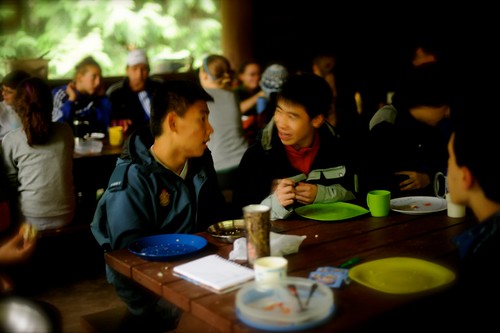 Once on the trip itself, involved committees are responsible for the scheduling, preparation, delivery, and cleanup of the meal, which can involve any combination of volunteer-forces the class chooses to muster up. The incentive of natural consequences (We don’t cook, we don’t eat. We don’t eat (or clean up), we don’t have a campfire.) powers the need for collaboration and communication from start to finish, and fosters relationships and trust within the class community. Bread is only broken once everyone has been served, and it is customary that a few words of wisdom or thanks are shared before the meal commences, and the din of conversation engulfs everyone and everything.
Once on the trip itself, involved committees are responsible for the scheduling, preparation, delivery, and cleanup of the meal, which can involve any combination of volunteer-forces the class chooses to muster up. The incentive of natural consequences (We don’t cook, we don’t eat. We don’t eat (or clean up), we don’t have a campfire.) powers the need for collaboration and communication from start to finish, and fosters relationships and trust within the class community. Bread is only broken once everyone has been served, and it is customary that a few words of wisdom or thanks are shared before the meal commences, and the din of conversation engulfs everyone and everything.
Weather
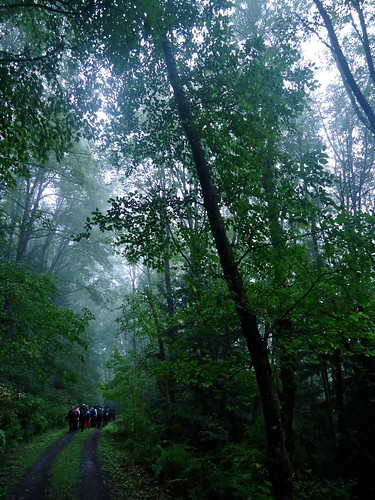 On the west coast, the idea of rain in September is something of an inevitability to the extent that the advent of sunshine on a September Retreat is akin to winning a meteorological lottery of sorts. Survival – or at the very least, comfort – in British Columbia’s natural elements depends on an ability to prepare and share a stable shelter with one’s fellow travellers. Whether in the form of maintaining a fire in the wood-stove for the drying of constantly sodden clothing, or the 4am gusts of wind and rain that find friends arguing with half-hitch knots and headlamps in the middle of the night, the ordeal of an adventure in the woods is an omnipresent demand to see opportunity in crisis, and the glass as half-full (or, more appropriately, overflowing).
On the west coast, the idea of rain in September is something of an inevitability to the extent that the advent of sunshine on a September Retreat is akin to winning a meteorological lottery of sorts. Survival – or at the very least, comfort – in British Columbia’s natural elements depends on an ability to prepare and share a stable shelter with one’s fellow travellers. Whether in the form of maintaining a fire in the wood-stove for the drying of constantly sodden clothing, or the 4am gusts of wind and rain that find friends arguing with half-hitch knots and headlamps in the middle of the night, the ordeal of an adventure in the woods is an omnipresent demand to see opportunity in crisis, and the glass as half-full (or, more appropriately, overflowing).
The forests of the west are green and snow-capped as a result of the winter winds that buffet our coasts with rain that allow the salmon to swim home, and to deny the necessary beauty of the rain is to deny this place we call home. There are, as my friend Andy Forgrave reminds me, “Two kinds of weather: memorable, and forgettable,” and the rain that seems to find us every year on at least one of our trips is at times of either sort.
“There is also that little-mentioned third category,” Andy adds, however. “Dry.”
Games
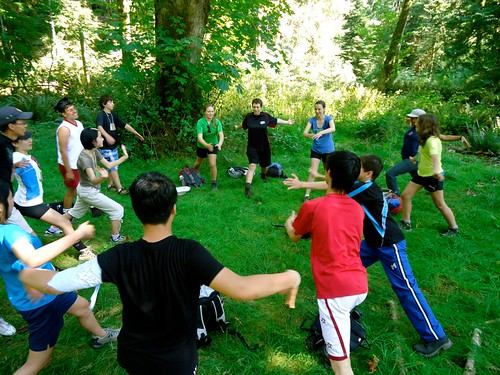 Without the distractions of iPods and text messages, Facebook or television, it never fails to amaze me how quickly TALONS and other teens assemble into naturally occurring orbs of conversation, laughter and friendly competition that (for Dean Shareski) coalesce on beaches, in forests, and on water. With a fire roaring in the wood stove, and voices echoing in the second-growth cedar and hemlock, a group passes more than an hour dissecting the intricacies of a riddle. The same woods are freckled with games of Camouflage, and Ninja. Russian card games. Twenty-five person rings of Stella Ella Ola.
Without the distractions of iPods and text messages, Facebook or television, it never fails to amaze me how quickly TALONS and other teens assemble into naturally occurring orbs of conversation, laughter and friendly competition that (for Dean Shareski) coalesce on beaches, in forests, and on water. With a fire roaring in the wood stove, and voices echoing in the second-growth cedar and hemlock, a group passes more than an hour dissecting the intricacies of a riddle. The same woods are freckled with games of Camouflage, and Ninja. Russian card games. Twenty-five person rings of Stella Ella Ola.
These songs and games are generally learned in elementary, or middle school, and are the stuff of our children’s learning rituals of play – they exist in every corner of the world, and in many cases (I’m sure) mimic one another. That they spring up in BC’s forests, or in hotel lobbies in Cuba, places where we might find ourselves pining for a sense of identity or home, shouldn’t surprise at all. We often think of our culture as being made up of the songs we sing, and the stories we tell; but it is startling to realize that our repertoire of games and riddles is a shared story as well.
Hiking
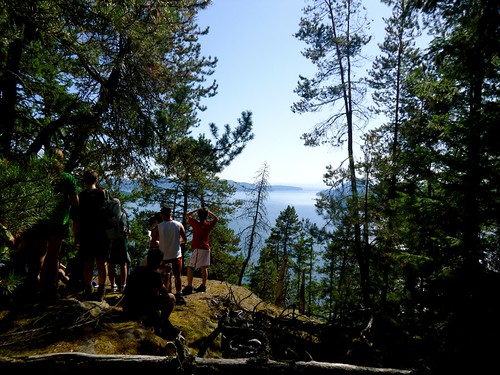 In the years that I have been with TALONS, we have hiked on the west coast of Vancouver Island, in the forests of the Lower Mainland, North Shore, and Fraser Valley, as well as across peaks in the Gulf Islands. We have covered urban and rural terrain, wilderness and back countries with go-gear, water bottles and enjoyed countless hours of meandering conversations and Ninja-breaks along the trails and pathways of our provincial and regional parks in rain, sunshine, and fog, wandering for hours only to arrive in campsite we left that morning. Bonds are formed on these walks that are cyclical odes to the journey being important above the destination, and the company we keep mattering much more than what we might be doing with it.
In the years that I have been with TALONS, we have hiked on the west coast of Vancouver Island, in the forests of the Lower Mainland, North Shore, and Fraser Valley, as well as across peaks in the Gulf Islands. We have covered urban and rural terrain, wilderness and back countries with go-gear, water bottles and enjoyed countless hours of meandering conversations and Ninja-breaks along the trails and pathways of our provincial and regional parks in rain, sunshine, and fog, wandering for hours only to arrive in campsite we left that morning. Bonds are formed on these walks that are cyclical odes to the journey being important above the destination, and the company we keep mattering much more than what we might be doing with it.
Sometimes, it is enough just to walk.
Night Solos
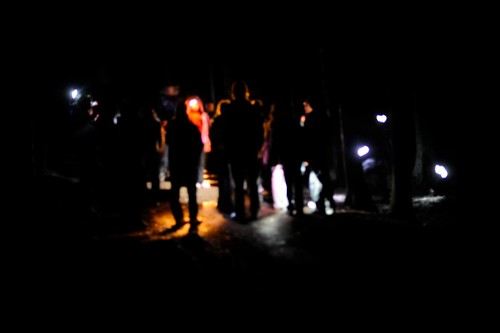 “How much of our fear of the dark stretches back to our evolved relationship with so many years spent living in the dark?” Mr. Albright asks me during one of our hikes around Hick’s Lake this weekend. The night before, we had marched the class out into the forest surrounding the campsite to participate in a “Night Solo,” where each member of the class sought out a solitary space at a distance (from the teachers’ lantern) of their own choosing. And with lights out we sat in inky silence for more than ten minutes, listening to rain pelting the upper canopy of forest. Our hiking conversation that following day had shifted to human beings’ relationship with fire (learned relatively late in our development as the species homo sapiens sapiens, or, to interpret the Latin, the Wise One).
“How much of our fear of the dark stretches back to our evolved relationship with so many years spent living in the dark?” Mr. Albright asks me during one of our hikes around Hick’s Lake this weekend. The night before, we had marched the class out into the forest surrounding the campsite to participate in a “Night Solo,” where each member of the class sought out a solitary space at a distance (from the teachers’ lantern) of their own choosing. And with lights out we sat in inky silence for more than ten minutes, listening to rain pelting the upper canopy of forest. Our hiking conversation that following day had shifted to human beings’ relationship with fire (learned relatively late in our development as the species homo sapiens sapiens, or, to interpret the Latin, the Wise One).
“If you can imagine what it would have been like to be a human, or one of our earlier ancestors who lived in a world that didn’t yet know fire,” I told the class before we went out into the woods on the evening following the hike. “What you feel as an instinctual rejection of the dark is part of that history, and our story as people. Listen to it. Be with it.”
We walked out into the woods and within minutes were greeted in our silences by the persistent hooting of an owl presiding over the camp for the duration of our solo. Scattered across the forest floor, in a blackness that enveloped all but the distant moon shining off the lake below, the owl rang its voice across the treetops, cradling us all. When I called out finally for the solo to end, seconds swelled and stretched in silence as no one wanted the moment to be gone.
Our ambition as TALONS facilitators is often to nurture these individual worlds, where everything needed for survival, or even thriving, is brought along in backpacks and the people assembled in a given place. Enjoying the peace of sitting in the woods at night alone, a serenity connected to the most basic of human fears of loneliness, made possible in the company of trusted peers. If a more apt metaphor for the autonomy that TALONS espouses exists, I’d love to hear it.
Temperature Reading
Toward the end of every evening around a TALONS campfire, once the songs have all been sung, and our solitudes have been confirmed in the surrounding forests, it is a nightly tradition that the group concludes its evening by offering each member of the class the opportunity to offer a rating for the day accompanied by a brief reflection on the day’s events. Time for laughter, learning, or the airing of grievances, I have seen and witnessed moments of the most awesome honesty and collective triumph in these circular conversations, as each day adjourns with an affirmation of the wisdom that we all might:
Look well on today, for in its brief course lie all the variation and realities of your life – the bliss of growth, the glory of action, the splendor of beauty. For yesterday is but a dream, and tomorrow a vision. But today well-lived makes every yesterday a dream of happiness, and every tomorrow a vision of hope. 1
- M. Wylie Blanchet’s The Curve of Time ↩
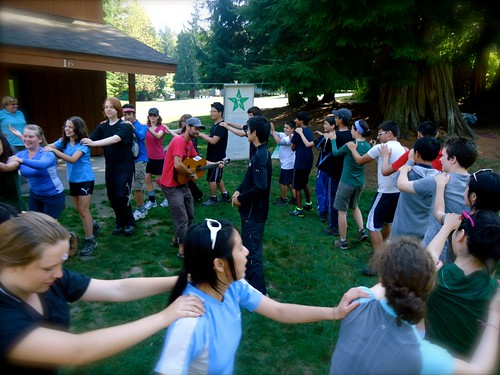

One thought on “Why Learning Outside Matters”
Comments are closed.